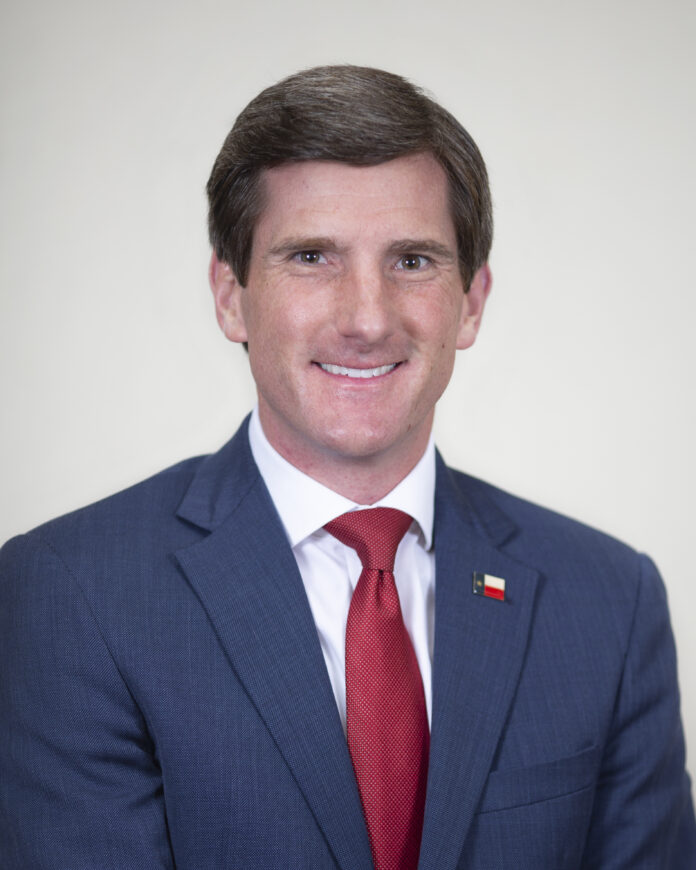One of State Rep. Brooks Landgraf’s proudest achievements during his first session as chairman of the House Environmental Regulation Committee in Austin was the passage of his House Bill 7 to make it illegal for the U.S. Nuclear Regulatory Commission to use the proposed Interim Storage Partners site 30 miles west 0f Andrews to dispose of high-level radioactive waste with a half-life of 24,000 years, which Landgraf and Gov. Greg Abbott say could end up contaminating the Permian Basin’s oil and natural gas deposits and destroying the region’s economy.
More broadly, the new law bans the storage and disposal of such waste anywhere within state lines; however, it allows nuclear reactors in Texas to continue operating normally, storing the waste they generate on site.
Noting that the state-federal sovereignty battle is now being waged in the U.S. 5th Circuit Court of Appeals in New Orleans, Landgraf noted that Gov. Greg Abbott and Congressman August Pfluger are supporting the state with Pfluger recently having filed his own bill in Washington to vehemently oppose the dump.
“We’re saying one thing and the feds are saying something else,” he said. “The NRC has already issued a license for high-level waste to be stored near Andrews, but we’re saying it would be a violation of state law if any storage took place.”
He declined to predict when or how the issue will be resolved.
In a brief filed Feb. 7 with the 5th Court by Attorney General Ken Paxton and supplemented by Abbott, the state says the NRC “committed a massive breach” of a January 1998 congressional directive to the U.S. Department of Energy by granting Interim Storage Partners a license to store the waste above ground in Andrews County.
Interim Storage Partners was formed by Waste Control Specialists, which has operated a low-level waste repository at the site since 1995, and Orano USA, a subsidiary of the French company Orano.
The brief says in part, “The NRC, which Congress tasked with ensuring the safe use of radioactive materials, has reacted to the consequences of that breach by undertaking a risky, wholly unauthorized approach: issuing a license to allow a private entity to take possession of nuclear waste and transport it from numerous locations across the entire country to an above-ground storage site in Texas, far from the reactor sites where the waste was generated.
“The Commission claims that the license is only ‘interim.’ But the license was issued for a 40-year term, is renewable and is unaccompanied by any plan to eventually transfer the waste to a permanent repository. If the commission’s plan proceeds, the odds are that this waste will be stored forever in the State of Texas.”
Presiding over his first committee in the spring of last year, Landgraf had served on the House Committee on Energy Resources from 2015-19. The Environmental Regulation Committee also sets policy for the Texas Commission on Environmental Quality.
“We passed a law that modernized the Texas Emissi0ns Plan through the TCEQ to apply the most innovative technology and help make the air cleaner,” the 81st District Republican from Odessa said. “The old emissions plan had been in place for some time and it needed modernization.
“There are very few chairmanships to go around among 150 members and I feel a lot of responsibility. Speaker Dade Phelan and I are good friends and I am very supportive of his speakership.”
Landgraf said his committee killed several Green New Deal bills that “were very extreme and sought to implement proposals that would have been devastating to our economy and jobs in the Permian Basin.
“I saw it as my job to thwart those bad policies and make sure that none of those bills passed out of my committee,” he said. “There is a wing of the Democratic Party that does not believe in the efficacy of fossil fuels and wants to eliminate them altogether. In a place like the Basin, that is our bread and butter and those bills would have been devastating to so many of the people I serve. You can’t fool yourself into thinking we could get by on renewable energy.”
Landgraf’s fellow members on the Environmental Regulation Committee are Democrats Alex Dominguez of Brownsville, the vice chairman, Vikki Goodwin of Austin, Penny Morales Shaw of Houston and Ron Reynolds of Missouri City and Republicans Jay Dean of Longview, Kyle Kacal of College Station, John Kuempel of Seguin and Geanie Morrison of Victoria.
“I believe our mission is to strike that balance between promoting a clean and safe environment and cultivating a strong economy,” he said. “We should ensure reasonable and predictable regulations that avoid policies seeking to regulate indirectly. We need to review and modernize policies to see that we are properly adapting to changing conditions in the environment and the economy.”




